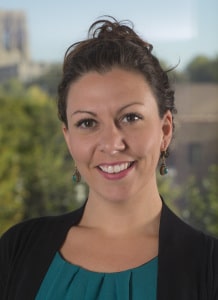This quarter, we spoke with Nicole Anderson, an MA in WRD alum and a recipient of the Graduate Certificate in TESOL. Nicole works as the Associate Director of International Alumni Programs at the University of Chicago. She travels frequently, working with alumni communities in Europe, the Middle East, and Africa to build their networks and support the events they organize.
We’re happy she took the time to share a little about her experiences!
What was your academic and professional background prior to entering WRD?
I have a BA in English from Loyola Chicago, which was followed by a year of temp work in Chicago before I joined the Peace Corps. I spent two years in Morocco working in a small town called Ben Ahmed, just outside of Casablanca. One of my jobs there was to teach English classes. As my tenure was coming to an end, I started searching for what would be next for me. I realized I enjoyed teaching English but what stood out in my mind was teaching advanced second language learner students writing. Thus, WRD emerged as the ideal place to further my knowledge. TESOL, teaching writing, rhetoric—what more could I want?
Describe your career and research interests as you were going through the MA in WRD program. How did you customize the program to meet your needs?
WRD ended up being exactly what I thought it was going to be. It was the opportunity to make sense of the teaching experience I had in Morocco and deepen my knowledge of teaching writing and ESL. Since I had extensive teaching experience without any training, my learning was a bit inverted from the usual experience. I had already experienced many of the bumps and complications that I read about in our classes. The theoretical break down of teaching writing and language acquisition transformed what was a confusing and muddled experience into something defined and defining.
How have you used your experiences from WRD and TESOL in your current position?
Understanding the way rhetoric influences us and others permeates everything I do. The way I write emails, the appreciation for Facebook posts as a piece of writing and inherently rhetorical, the understanding that visual rhetoric is as important as what is said have all contributed to the way I do any project I’m given.
What are you plans for the future? How will you continue to use your degree?
I am making a move within the University of Chicago to help manage the International Innovation Corps (IIC) as they grow from a start-up to an official university program. IIC is a wonderful program that launches social development projects in India, but it is so new that no one has yet articulated who they are and what they are doing. They’ve asked me to help them build this narrative. I’m excited to do this with them, think about who our audience is, what we are trying to convey, and what the best medium is to do it—all things directly from my WRD learnings.
Any advice for current or prospective MA in WRD students? Or for students thinking about pursuing a Graduate Certificate in TESOL?
- Be open to what life brings you and say yes to opportunity.
Early in my studies I was a Biology/Business major and then changed to English, which led to international travel and ultimately to the Peace Corps. Because I accepted an opportunity to teach writing during the Peace Corps, I discovered my interest in teaching writing and that led me to WRD. While I had no alumni relations experience, my international experience was enough to get me in the door at UChicago. And it’s this foot in the door at UChicago that has opened up the opportunity at IIC. So you never know how things will end up!
- Be a critical thinker (something WRD is great at teaching!).
While most of my experiences have not called on me to quote ancient rhetorical thought, I have tried to approach challenges by thinking about them in the same way I thought about Foucault or Cicero. As I stared baffled at those pages, trying to find sense and meaning, I reconstructed the words and ideas until I understood. This process has been a lifesaver as I’ve been thrown in to various projects with only part of the knowledge or skills needed.
- Have fun and be positive.
Every experience has something to gain from it. Sometimes it’s new friend or a free coffee. Other times it’s something more transformative. WRD and TESOL has been a transformative experience for me and I recommend the program for all of the opportunities and experiences that it provides.
